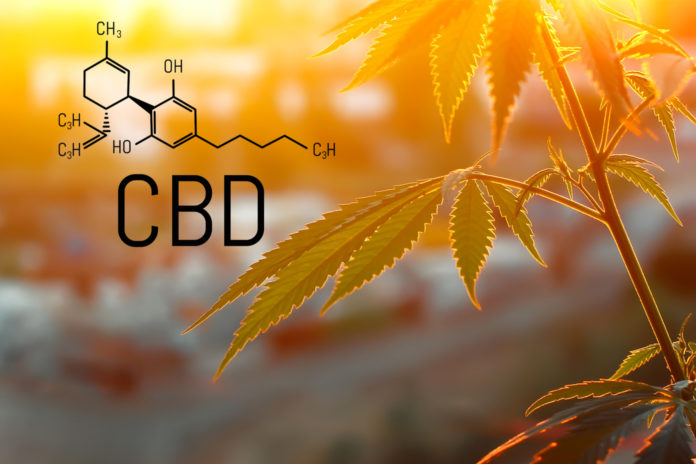On May 31, the Food and Drug Administration (FDA) will finally convene to debate the safety and efficacy of cannabidiol (CBD), a non-active compound found in cannabis. It’s a much-anticipated moment. Over the last few years, consumers have flocked to CBD-infused vitamins, food, drinks, and cosmetic products, spawning an $800 million industry—one that Brightfield Group estimates could surge to $22 billion by 2022.
Now those businesses, and the people who love their products, are looking to the federal government to decide the legal status of CBD. Things looked good in December, when the U.S. Congress legalized industrial hemp—from which CBD can be derived—in the 2018 Farm Bill. But three months later, the FDA begged to differ, issuing a statement that read, “We treat products containing cannabis or cannabis-derived compounds as we do any other FDA-regulated products.” Translation: Hemp-derived or not, the Farm Bill wasn’t going to be a free pass for CBD regulations. And with major cities like New York City and San Francisco cracking down on local food establishments selling CBD delicacies, you’ve got a regulatory landscape rife with contradictions.
One thing is clear: Whatever the FDA decides could have huge implications for this burgeoning sector. Here’s a breakdown of what the hearing is all about:
How will the comments period and hearing shed light on the FDA’s understanding of CBD?
The FDA scattered a few clues about its views on CBD throughout its announcement for the hearing. For one thing, the agency clearly notes that products containing CBD and THC cannot be marketed as food or dietary supplements. While this poses barriers to growth, it also suggests the FDA sees defining the safety parameters of CBD and THC as a critical factor in establishing an appropriate market pathway to legalizing cannabis at the federal level (right now cannabis is a Schedule I drug, on the same tier as heroin). Even the agency’s decision to hold a hearing reflects the pressure it’s under from lawmakers to find common ground with industry. In other words, the agency is aware of the country’s political will.
Pay close attention to the opening remarks, as well as the selection of speakers appearing in the longer opening sessions. This usually signals the direction the FDA will take in its development of policy and regulations.
What role does the FDA play in regulating CBD?
Because it has jurisdiction over food (for humans and animals), drugs, dietary supplements, and cosmetics, the FDA has direct authority over every aspect of the CBD industry as it stands today. The agency gained a good portion of its jurisdiction via the approval, last June, of the drug Epidiolex, a plant-derived formulation of CBD that treats childhood epilepsy. The decision acted as a Trojan horse: With CBD listed as an active ingredient in an approved drug, the FDA can now control its sale in interstate commerce and restrict its use in food and dietary supplements.
How could the FDA’s decision affect advertising and marketing claims?
The FDA’s main job is to protect consumers from food and drug products that don’t do what they promise to do—that’s why the agency tracks advertising and marketing claims so closely. When it comes to CBD, the FDA is most concerned with products that make claims related to the cure or prevention of specific diseases. Earlier in April, former FDA Commissioner Scott Gottlieb said he sent warning letters to three companies for issuing statements such as “CBD successfully stopped cancer cells in multiple different cervical cancer varieties.” The agency is highly likely to strike down similar claims going forward.
Will the FDA make a ruling? If so, what sort of regulations seem most likely?
There are three different regulatory avenues the FDA could follow. The most comprehensive of these would be to implement and enforce regulations to govern all CBD products. This would require a lot of time and effort. First, the FDA would need to publish proposed rules and open them to public comment. Based on feedback received, the agency would then revise the rules before issuing a final version. Other federal agencies, such as those devoted to small business or patients’ rights, would also have a say on how the rule might apply to their interests. The process could take several years to complete—at which point there’s a good chance CBD-based products will already be embedded in consumer habits, thus hardening the political will in favor of CBD.
Less complicated, the FDA could issue a guidance document to industry leaders laying out suggested requirements, particularly about content and marketing. CBD businesses wouldn’t be bound by that guidance; they could do what they want as long as their alternative approaches—maybe subtly shifting the language in their marketing material—do not violate other FDA statutes and regulations. Though not as burdensome as the issuance of formal regulations, guidance still requires a notice-and-comment process.
What’s more likely is an enforcement policy that uses existing food and drug laws to lay out how the FDA will regulate CBD companies. For instance, in 2016, manufacturers of over-the-counter homeopathic medicines were told that, as makers of similar products, they must show “competent and reliable scientific evidence for health-related claims, including claims that a product can treat specific conditions.” This is by far the simplest and quickest process since it generally does not require notice-and-comment rulemaking.
What’s at stake for the CBD industry? Could you walk us through a couple scenarios?
Since the approval of Epidiolex expands its authority, the FDA could plausibly prohibit the sale of all unapproved products that contain CBD. This would effectively shut the industry down.
Alternatively, the FDA may permit the sale of products that contain only limited levels of CBD and/or restrict what types of claims those products can make. Or the agency could choose to follow its current approach and focus only on CBD products that make disease claims. What the FDA decides hinges on anticipated risks to public health.
What would be most problematic for CBD companies is if the FDA does nothing at all. Without a formal decision, state and local authorities will continue to fill the void by issuing or enforcing CBD regulations of their own. Discrepancies between state regulations will result in a continuation of the current nightmare scenario where companies must navigate disparate state and local regulations that impede national product rollouts.
What can CBD companies do to prepare for the worst-case scenario?
The CBD industry needs to start lobbying for itself. Companies should start by examining their own product’s safety and collect credible data that supports the marketing of similar products.
Research and lobbying are time-consuming and expensive. Industry players should consider following a trade-organization model by pooling financial and professional resources with those of other CBD companies so the industry can start advocating for itself.
 Jason Vegotsky is an entrepreneur with an extensive background in sales and business development. As chief revenue officer for Kush Supply Co. he leads a team of over forty-five sales professionals; handles operations, shared services, and project management; and is responsible for expanding the company’s nationwide physical presence.
Jason Vegotsky is an entrepreneur with an extensive background in sales and business development. As chief revenue officer for Kush Supply Co. he leads a team of over forty-five sales professionals; handles operations, shared services, and project management; and is responsible for expanding the company’s nationwide physical presence.


